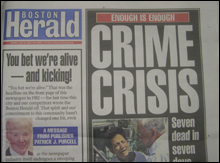
The Herald stands alone, and Liberty Group Publishing becomes a major local media player in a dramatic three-part newspaper deal.
|
“You bet we’re alive — and kicking!” declared the headline on Herald owner Pat Purcell’s feisty message to readers on Monday. (That phrasing — no accident — is a reprise of the famous “You Bet We’re Alive” Herald headline announcing the paper’s lifesaving sale to Rupert Murdoch in 1982.) But if the Herald splash was that Purcell was keeping the troubled tabloid he has owned for a dozen years, the bigger story was that Boston’s newspaper landscape has been dramatically and irrevocably altered by a three-way deal that broke so suddenly last Friday that some of Purcell’s employees learned about it on the Boston Globe Web site.
In a widely anticipated move, Purcell survived by agreeing to sell his profitable suburban-oriented Community Newspaper Company (CNC) chain of more than 100 publications, including four dailies, to the Illinois-based Liberty Group Publishing for, according to the Globe, about $225 million. Liberty then doubled down, swooping in to pick up the Enterprise NewsMedia collection of the Patriot Ledger in Quincy and the Enterprise in Brockton, and the 23-paper MPG chain of South Shore weeklies, all for a reported $165 to $175 million.
For years, local media operators — ranging from Fidelity Investments when it owned CNC to Purcell himself — had coveted the potentially potent combination of the CNC papers and the Enterprise outlets. And with good reason. Liberty holdings now blanket the eastern part of the state like a February blizzard and encircle the Globe.
In the end, the big prize was snatched by a largely unknown eight-year-old Illinois company — one that has never operated in Massachusetts — with an undistinguished track record and a history of buying monopoly papers in small towns. Suddenly, Liberty — soon to be renamed GateHouse Media — has control of a big chunk of the local-media chessboard. And no one seems quite sure what to make of it.
“One assumes, since they own small-town dailies, they pretty much have the market to themselves,” says newspaper consultant John Morton. “They’re small-town newspapers: they don’t usually get on the radar screen.”
Given that many of its papers have a circulation of less than 20,000, the Massachusetts acquisitions are a “big bite” for Liberty. Ventures one veteran media observer: “This is a huge step up for them.”
But if the Liberty acquisition has raised more questions about the future of Massachusetts journalism than it has answered, the Herald’s status is, likewise, far from permanently resolved.
Purcell came out slugging in Monday’s paper, declaring in his message: “So let me dash the fondest hopes of the politicians, the prognosticators and our competitors at the Globe. The Boston Herald is here to stay.” But while the Liberty deal may have cleared debt and given Purcell breathing room, few think he can make the paper work without cutting more costs and perhaps trying something more dramatic — such as a free-distribution model.